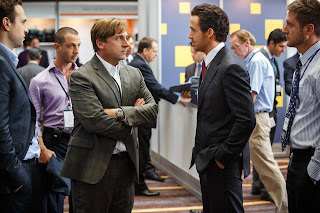As you will all no doubt remember, in
2007 the financial world had a little bit of a cataclysmic meltdown due to the
reckless behavior of some money men on Wall Street. A lot of white men in suits had created some
difficult financial mechanisms that included hundreds of thousands of
mortgages, which could be traded and repackaged and traded and repackaged and
traded and repackaged…and as long as the house prices kept going up, everyone
was happy.
Yet in 2005, an outsider hedge
fund-manager and blogger called Michael Burry (Christian Bale) discovers that a huge amount of these mortgages are
at risk of default (or ‘subprime’), and are in fact likely to lead to a massive
reversal in fortune for the investment banks.
This idea resonates with a number of other maverick financiers, such as
the exasperated Mark Baum (Steve Carrell)
and shady trader Jared Vennett (Ryan
Gosling), who were willing to bet big against the housing market: The Big Short.
Director and screenwriter Adam McKay is more known for his “comedy”
films such as Anchorman: The Legend of
Ron Burgundy; Wake up, Ron Burgundy:
The Lost Movie and Anchorman 2: The
Legend Continues, so might not have seemed the most obvious choice for
adapting Michael Lewis’s serious book The Big Short: Inside
the Doomsday Machine. Yet apart
from a few uncontrollable twitches, the film is indeed a mostly dramatic
retelling of the build up to the meltdown from inside the investment banks and
surrounding economic Sodom and/or Gomorrah.
The whole genesis of the real-life
crisis was that none of the bankers involved knew what the hell they were
creating, valuing and trading, and so barely anyone could see the risks
involved. And because of all the
cacophony of financial jargon – credit default swap markets; collateralized
debt obligations; synthetic collateralized
debt obligations – the narrative is unashamedly hard to follow in places. Yet, rather than have awkward passages of
character exposition explaining these things, McKay’s resolution to this is
simply have a character break the forth wall to explain it to us – or to have Margot Robbie, Anthony Bourdain or Selena
Gomez burst in with a crass metaphor involving fish dinners or casinos…
 |
| Mark Baum and Jared Vennett: Money Men |
I’ll admit that the style of The Big Short took me about half an hour
to smooth in to, but once the plot took hold I was completely hooked. I’ve read a number of weighty books on the
subject, and loved other recent financial thrillers on the crisis such as Inside Job, Margin Call and HBO’s brilliant Too
Big To Fail. Yet The Big Short is easily the most
accessible, and tells the vitally important story of criminal financial
chicanery, but for the Wolf of Wall
Street crowd. Spielberg’s riotous
epic in reference heavily as Baum and his team head to strip joints to
interview dancers in Vegas and shooting ranges to shoot Osama cut-outs with
clients all with a soundtrack of The Polyphonic
Spree, Run The Jewels and Ladytron.
For all of its fun and pace, the film
contains two monumental gut-punches. Two
other early eager young investors find Burry’s paper and team up with retired,
veteran Ben Rickert (Brad Pitt) to
also short the market. Yet when the
inevitable collapse begins and they start the celebrations, Rickert fiercely
reminds them that for their investment to succeed the American Economy has to
collapse – a choking interruption to all of the fun as the consequences for the
innocent victims begins to emerge. The second,
and even bigger punch to the system emerges in 130th minute in the
titles before the credits that explain that the messy financial alchemy is
alive and well in 2015 under the new guise of “bespoke opportunity tranches”
that are as threatening as the infamous collateralized debt obligations from
2005.
The risk at the heart of The Big Short was to focus on the personalities
of the hand full of oddball characters – Burry, Baum, Vennett et al – instead
of the more important criminality at the centre of the story. Yet McKay just about swaggers through enough
of the difficult economics so that the big message still shines through. That bankers are the enemy of the free world
and to give them the same freedom that they had ten years ago will destroy us
all. And we will all be left short. Big, big short…

No comments:
Post a Comment